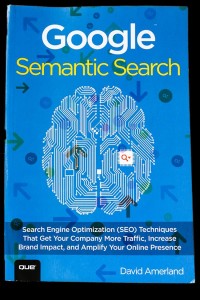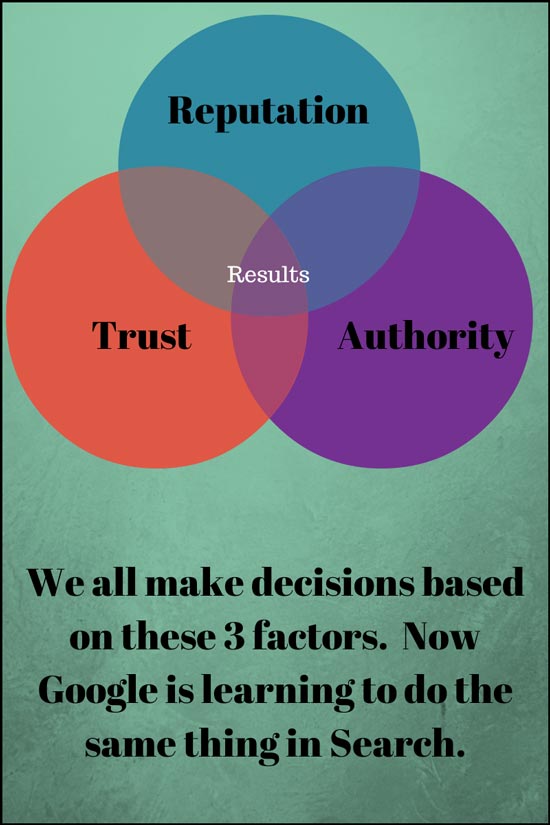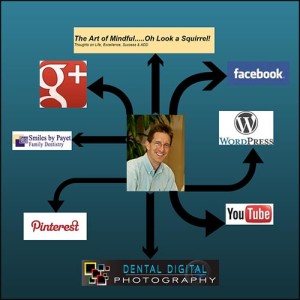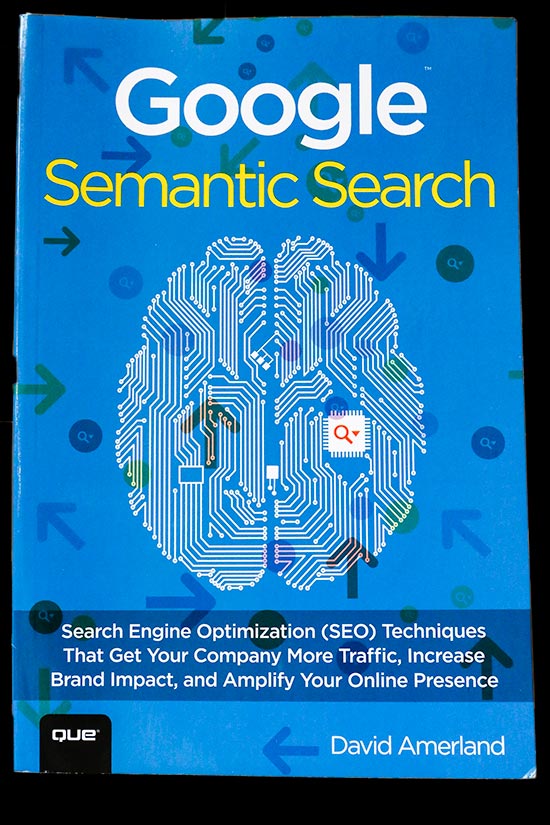 To begin my review, I’d like to quote a paragraph from near the end of the book as an inverse of Stephen Covey, you might say, “End with the Beginning in Mind.” 🙂
To begin my review, I’d like to quote a paragraph from near the end of the book as an inverse of Stephen Covey, you might say, “End with the Beginning in Mind.” 🙂
The busy businessman on the go talking to his [POS] Android phone and asking for best restaurant locations is hardly aware that in the intervening microseconds before he gets an answer back Google has checked his location, looked at its store of local knowledge, checked his Google account profile and his social connections, looked at reviews of local restaurants any social connections of his may have made, and looked at independent reviews of local restaurants on independent review sites. It has assessed the restaurants it has found based on its knowledge of the quality of their websites and the behavior of those who visit them, and it has drawn up a short list to show on search, based on distance from where the businessman is.
Editorial comment: David did not include the pejorative “POS” to describe Android phones in his book – that’s my own editing to correct what I saw as a glaring omission in his writing. LOL Yes, I’m an Apple fan, and David isn’t. Ah well, even he isn’t perfect. Just helping you out there, David. 🙂
Reviewer’s Personal Note: I actually have difficulty writing a typical “book review,” because I’m not good at remembering specific quotes or points. It’s an ADD weakness, I guess. I like the general concepts and figuring out how to apply them in my life. What I’ve done with my review, is to write how I see this book affecting me personally and as a small business owner, and a bit on how it will affect my daughters as they grow up in an increasingly digital, data-driven world
Why is a Dentist Reading a Book About Google Search?
For those who don’t know, since early 2008, I’ve done almost all of my own website design, blogging, media creation, social media, and search engine optimization (SEO). I started doing so out of sheer necessity; with the world economy crashing down and the Charlotte economy so dependent on banking, business was BAD. Since we needed more new patients and a more effective website was needed for that, I dove in and started learning some new languages and programs: CSS, HTML, Dreamweaver, WordPress, SEO….and oh boy, did my head hurt a lot. In the end, it paid off, and my work on our websites has been a tremendous driving force behind our dental practice success for the last 5 years.
But now the game is changing, and in ways that I couldn’t have really imagined when I started, and David’s book Google Semantic Search has helped me grasp just how big the looming change is. As probably the only dentist in the world to have read it, I hope it will also position me for continued success.
Big Data is Changing Search, and Search is Changing Our World
I met David Amerland on what is now my favorite social media network of all: Google+. No, despite what some idiot tech writers may want you to believe, it is NOT a ghost town. Not unless you count the nearly 4,700 people who follow me as “ghosts.” Where he really grabbed my attention, and the posts on which we first seriously interacted/conversed, were his Sunday Read posts, in which he offers complex and thought-provoking subjects for consideration every Sunday. And then I learned that he was releasing a book about how Google Search is being fundamentally changed by the power of semantic understanding of Big Data, and I just knew that this was a book I needed, so I quickly ordered from Amazon. I wasn’t disappointed.
In language that even a non-techie person can understand, David lays out the foundations for how Google is fundamentally changing how it works, and given the power that Google holds for all of us today, that’s something worth understanding. For a small business owner like myself, understanding what is happening is crucial to surviving, and preferably thriving, in today’s increasingly competitive online market.
What is “Semantic” Search ?
?
For those unfamiliar with how Google works, even on a minimal level, Google provides answers for our questions via algorithms that sort through the massive amount of data that it indexes every day. (BTW – other search engines are working on much the same thing, but since Google is the 800lb gorilla, that’s David’s focus, and mine in this review). As the staggering volume of data increases, it becomes increasingly important that Google “understand” what it indexes at a deeper level of meaning (semantics) than simply how many links are pointing in or out, or how many keywords are in the content, etc. Otherwise, algorithms alone eventually become swamped; real understanding allows faster sifting and sorting the wheat from the chaff. In addition, algorithms can be gamed, e.g. “black hat” SEO. Genuine understanding is much harder to game, and as David says, semantic search makes the work involved in black hat SEO no longer worth the effort.
In order to make sense of it, Google is “learning” who people are (identity), what their significance is based on what they write (content), how they write (style), who reads and shares and comments (audience), their relationships to authoritative sites (associations), and more, and by putting all of these pieces (each individually known as a “node”), Google is “understanding” who, what, why, value, context, meaning…….and that leads to improvements in what drives Web search: Trust, Authority, and Reputation.
Why Should We Care About Semantic Search?
Since most of the people reading this blog probably have little interest in the technical details (HOW) of Search, the WHY is the big question that will interest most of you. But to put the technical side in perspective, let’s take a section of the Book to which many people can relate, from Chapter 2 pg. 22:
Anyone who has ever watched an episode of Star Trek knows that on the USS Starship Enterprise computing is both ubiquitous and intelligent. … The captain speaks to it the same way he’d speak to an individual. … If that’s not wondrous enough the Star Trek computer understand speech without any problem … and it collects its own data through its sensors making it therefore both instantly scalable and independent of its operators. …More than that, being unable to forget, the ship’s computer must get smarter and smarter with every Star Trek mission, until, I suppose, at some point its intelligence would surpass the intelligence of its makers and we wil get the so-called singularity, where machine intelligence is greater than human.
All of this is important because, right now, the search that Google has implemented is heading that exact, same direction.
Does this frighten or excite you? For me, it’s a bit of both.
My Online and IRL Identities
 The thing is, given that all of this data being collected by Google is generated by people, the only way Google can begin to develop the necessary concepts of Trust, Authority, and Reputation within it’s index, is for it to know who these people are. Or…….who you and I are. It’s been doing much of this through it’s development of Google+, or what it calls it’s social layer of search. If you were affected by the requirement that YouTube commenters use a Google+ account to do so, this is part of the reason why (besides trying to decrease the number of troll comments by bots) – to know if what you contribute online is of value within it’s index, i.e. should it serve up your contributions for any given search, Google needs to know who you and I are. And quite frankly, this is one fundamental reason why Google+ isn’t going anywhere, even if they rebrand it in some way. Google+ is now thoroughly integrated through every Google service there is and is actually essential to the improvement of Semantic Search.
The thing is, given that all of this data being collected by Google is generated by people, the only way Google can begin to develop the necessary concepts of Trust, Authority, and Reputation within it’s index, is for it to know who these people are. Or…….who you and I are. It’s been doing much of this through it’s development of Google+, or what it calls it’s social layer of search. If you were affected by the requirement that YouTube commenters use a Google+ account to do so, this is part of the reason why (besides trying to decrease the number of troll comments by bots) – to know if what you contribute online is of value within it’s index, i.e. should it serve up your contributions for any given search, Google needs to know who you and I are. And quite frankly, this is one fundamental reason why Google+ isn’t going anywhere, even if they rebrand it in some way. Google+ is now thoroughly integrated through every Google service there is and is actually essential to the improvement of Semantic Search.
As Big Data only continues to grow, and the amount of information about us online grows, the separation between our “real” lives and our “digital” lives will shrink ever smaller. For my daughter Natalie, her generation is really on the forefront of this boom, as hers is the first generation to grow up with technology so ubiquitous, it’s hard to imagine life without it. My Generation X saw it grow from desktops to laptops to cellphones and now wearable technology, but hers really has no concept of life without it. For my younger daughter Elizabeth, I have trouble imagining what the next step will be. She’s already better able to use the iPad and iPhone than my wife (admittedly, my wife is not a technophile by any stretch of the imagination, but still). When I was in college, the only digital “identity” that I had was email. Now it’s Google+, Facebook, Pinterest, LinkedIn, 3 self-created and run websites, YoutTube channel……who/what would I be in today’s world if that suddenly disappeared from the Web?
Search is Becoming Personalized – What About Privacy?
For those involved in SEO, the “Holy Grail” has always been to be ranked on the 1st page of Google’s search results. What’s happening now, however, as Google knows more and more about us (that’s both the exciting and scary part, and Google isn’t the only one), the results that we receive on that 1st page are becoming personalized and individualized. David describes how Semantic Search is the driving force behind this, in ways that are still developing. But what about Privacy? If getting the most individualized results (refer back to the quote at the beginning of my review) depends on search engines knowing as much as possible about us, what does that mean for privacy? If the result of greater information availability is greater transparency, is that always a good thing? Do we have a choice even if it’s not? The European Union is trying to draw some clear lines, but their recent decision left a lot to be desired.
This is an area that David broaches in the book, but as it’s an entire field unto itself, he gives the reader enough of a taste to imagine and curiosity to delve deeper if the reader so chooses.
Authentic Content Generates Trust Builds Reputation
For those involved in SEO for business, David certainly provides some terrific checklists to get started on necessary steps, and rest assured, I’ve already been working on that since reading the book. If you hadn’t thought about it……this article is a perfect example. 🙂 But really, it’s simple enough – create unique and valuable content that will provide genuine value to your readers, in such a way that they want to share it further, to build a greater audience that looks to you for authoritative content that works for them – and you’re golden. Admittedly, there are a lot of implementation steps in there, but that’s the fundamentals, and as David says, it’s a fabulous thing.
With genuine content that provides value to the reader now being easier to rank than spam (something far more difficult when algorithms alone ran the web), and harder to fake due to established identities (Authorship, Publisher tags) across multiple verified platforms, the Web is finally on the verge of becoming the more ideal system of real information that it was originally envisioned to be. And that is truly awesome.
I highly recommend this book to anyone interested in how Google, and other search engines to a lesser degree at this time, works and is changing. If you’re in a small business, this is an absolute must-read.
Now, if I can just get David over that silly aversion to Apple products……

Testing……sorry for anyone who wants to comment, not sure why they’re closed, as they shouldn’t be. Hopefully I’ll get it sorted out soon.